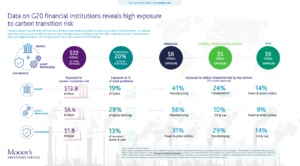Breaking News

Moody’s: G20 Financial Institutions Face $22 Trillion of Exposure to Carbon-intensive Sectors
Moody’s Investors Service has published new data showing that G20 financial institutions have nearly $22 trillion of exposure to carbon-intensive sectors. On balance sheet bank loans account for $13.8 trillion or 60% of this, and asset managers’ equity holdings for another $6.6 trillion (30%). Large rated insurers’ invested assets, which are weighted towards cash and government securities, account for the remainder $1.8 trillion.
By sector, manufacturing, power & other utilities, transportation and oil & gas feature heavily among the G20 financial institutions’ top carbon-intensive exposures.
Meanwhile, by region, the Americas take up $8 trillion, EMEA $5 trillion and Asia $9 trillion.
The latest findings can be found in this new infographic containing data on G20 financial institutions’ exposure to carbon transition risk, as part of a campaign examining financial institutions’ exposure to carbon transition risk and the key triggers to thrive on the road to decarbonization.
- For banks, the decarbonization task compounds many of the industry’s other risks from transformative forces such as digitalization and cyber risk. With tighter regulatory scrutiny, environmental considerations will fundamentally alter decisions regarding the cost-benefit of lending to, and investing in, carbon-intensive sectors. Banks will need to ramp up their climate risk assessment capabilities, as well as governance and risk management frameworks.
Banks face risks to their franchises and credit profiles from exposures to climate-intensive industries, while climate-focused regulations and stakeholder pressures will increase legal and reputational risks. But the transformation to a low-carbon economy is creating vast financing opportunities, too: bank lending, together with green capital market funding, will help banks’ customers transition to low-carbon business models that require huge investments.
- For insurers, climate change is driving up the unpredictability of extreme weather and physical risks in their underwriting portfolios. This will lead to more profit volatility and potentially lost premium revenue as some risks become uninsurable. Insurers will increasingly need to balance regulatory and societal expectations for affordable insurance protection against the risks of extending coverage in an environment of rising uncertainty.
The push to decarbonize also raises the risk of stranded assets in their investment portfolios, while climate change litigation against their corporate clients could elevate claim costs. Insurers face tougher scrutiny of their carbon footprint from investors, regulators, clients and the public, which will require them to take decisive action. Those able to shift their business models and innovate faster than their peers will avoid the worst effects of climate change and benefit from new business opportunities.
- For asset managers, the industry’s exposure to carbon-intensive industries is substantial and climate change is severely testing their ability to navigate investment risk. Firms that pre-emptively identify and manage climate risk in their investment process can protect themselves against losses. Furthermore, asset managers can considerably benefit from opportunities in developing investment solutions that contribute to a low-carbon economy, meeting investors’ sustainability expectations.
Companies In This Post
- DIFC’s Dubai FinTech Summit Expands Globally with Pakistan Digital Authority Read more
- GoldenPeaks Capital Secures Largest PPA Deal in Hungary With Hankook Read more
- Volante Technologies: AI, Crypto, and Modern Banking Innovation Read more
- Payment Spayce and Sagicor Bank: Innovating Fintech for the Caribbean Market Read more
- Top Companies Supporting Former Workers with German Pension Refunds Read more
















